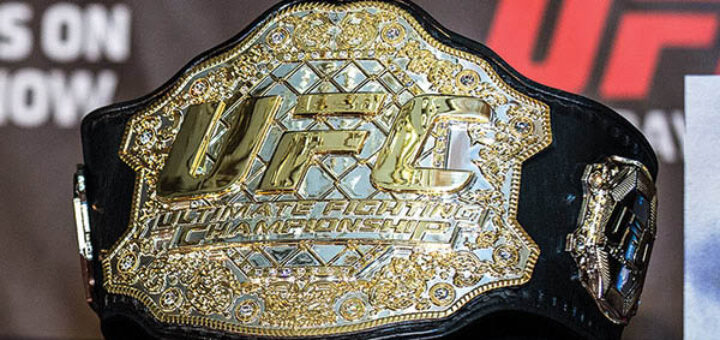UFC 279: The wildest 48 hours in MMA history

By Josh Werle, Sports Editor
The world of Mixed Martial Arts (MMA) is always entertaining. The most notable MMA organization, the Ultimate Fighting Championship (UFC) puts on events almost every Saturday of the year. Unlike other major sporting organizations, the UFC doesn’t have an offseason. The MMA giant run their events year-round, which means there is rarely ever a lack of content for fans of the sport. Throughout the years there have been a number of backstage brawls, fighters who miss weight and last-minute opponent changes, but these mishaps typically don’t occur all at once. Until now.
UFC 279 marked the last fight of superstar Nate Diaz’s contract, who stated that he had zero plans of re-signing and wished to try his hand at a different combat sport. Diaz has been a staple of the UFC for 15 years. He has been popular with fans due to his antics both inside and outside the cage, as well as his “gangster” persona. Diaz won the fifth season of the UFC’s Ultimate Fighter reality show in 2007, and has been competing ever since.
For all that he’s done for both the sport and the UFC itself, Diaz should have gotten a proper goodbye and faced another legend of the sport, but the organization had other plans. The UFC matched Diaz up with top-five Welterweight contender Khamzat Chimaev, who the oddsmakers gave a 92 per cent chance of defeating Diaz. After 72 hours of turmoil in the final days leading up to the event, it wasn’t Chimaev who Diaz was staring at across the cage, it was fellow MMA veteran Tony Ferguson.
The backstage brawl
On Sept. 8, just over 48 hours before the event, a press conference was set to take place which involved the six featured fighters on the card. Diaz, Chimaev, Ferguson, Li Jingliang, Daniel Rodriguez and Kevin Holland were set to take the stage and answer questions from the media. The original matchups were Diaz vs Chimaev, Ferguson vs Jingliang and Rodriguez vs Holland, but only Rodriguez and Holland actually made it to the stage.
UFC President Dana White announced shortly that he had to cancel the press conference, and that a brawl had broken out backstage involving numerous fighters and their respective teams. Luckily none of the athletes were seriously injured, and the event was not in jeopardy. This was only the tip of the iceberg though, as less than 24 hours later disaster struck again.
The weight miss
Chimaev and Diaz were scheduled to square off in the welterweight division, meaning that you would have to weigh in at no more than 171 pounds the Friday morning before the fight. Usually if a fighter misses their weight by one or two pounds, they get fined a percentage of their purse and the fight continues as scheduled.
On the morning of Sept. 9, reports emerged that Chimaev was presumably going to miss weight, and it wasn’t going to be by a small amount. Chimaev ended up stepping on the scale 7.5 pounds heavier than his contracted weight, and because he was in the main event, this put the entire production at risk of cancellation. Queue the Dana White magic. Some forget that White and his team put on the first sporting event after the initial COVID-19 lockdowns, and he also made use of a private island in the United Arab Emirates so that the UFC could still run events for fighters who lived outside the United States. White answers to nobody, and when it comes to his events he calls the shots.
The switch-up
Holland and Rodriguez, whose fight got finalized three weeks prior to the event, had their fight set at a catchweight of 180 pounds. This ended up being a saving grace for the event, because one of them could then compete against Chimaev because the weight discrepancy was only a few pounds.
White and his team got to work on the Friday afternoon, and miraculously were able to keep the event intact. In order to do this though, all six of the main fighters would see an opponent change on just over a 24-hour notice. Diaz stayed in the main event, and fought Ferguson, while Chimaev took on Holland. Jingliang was matched up against Rodriguez, who weighed in 10 pounds heavier than him. This was the most confusing of the three matchups, considering the weight discrepancy, it is shocking that the athletic commission allowed it to happen.
In the end, the event was saved, and arguably, the matchups were better than they were before. Diaz got the proper send off he deserved, as he submitted Ferguson in the fourth round of their fight. Chimaev got to settle the bad-blood he had with Holland, easily submitting him in the first round. Jingliang ended up losing a close split-decision to Rodriguez, which some fans were very unhappy about.
Although White and his team deserve some credit for taking a terrible situation and turning it into a better event overall, the fighters are the ones who deserve all of the credit. Without them accepting an opponent change on just over a 24-hour notice, none of this was possible. Styles make fights, and MMA athletes prepare for weeks studying their opponents. Having an opponent change a day before the event is virtually unheard of, let alone having three fights changed on the same card. UFC 279 is an event that will go down in history, and I’m confident that we may never see another scenario quite like this.


